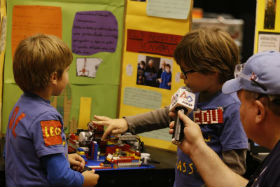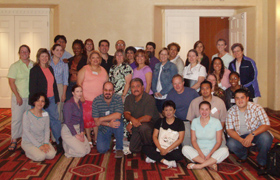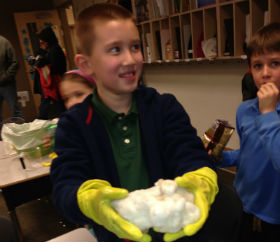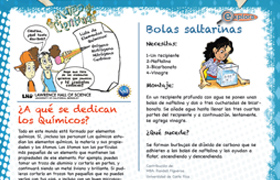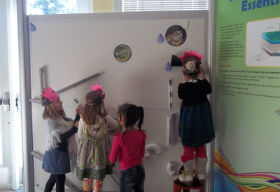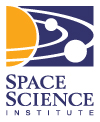Our Projects

Alien Earths Online
Alien Earths was a 3,000 square foot traveling exhibition that is now retired. Alien Earths Online is still going strong. The website features games like Planet Families where you can try your hand at designing the perfect solar system and includes MyStar, a stellar lifecycle game where users can build solar systems at a Million Years A Minute.
www.alienearths.org
PI: Paul Dusenbery; Funders: NSF and NASA; Start Date: 2005
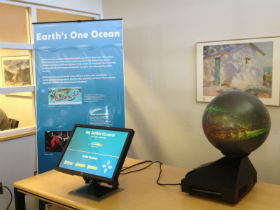
Discover Earth Research Project
The purpose of the project is to develop, implement, and evaluate several innovative geoscience education technologies (spherical and multi-touch flatscreen) that will be tested in a library setting. The project is exploring what kinds of social networking technologies work best to build an ESS library community of practice (CoP) and is producing several resources and activities that librarians can use to enrich the exhibit experience. Results will be disseminated through NCIL's STAR_Net project.
www.starnetlibraries.org
PI: Paul Dusenbery; Funders: NSF; Start Date: 2010
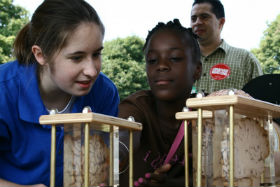
Discover Health
Discover Health (DH), a bi-lingual health education program for public libraries, directly addresses the nation’s most serious public health issues, especially among underserved and rural populations. It also encourages youth, especially those from at-risk communities, to pursue careers in health care professions. The project will engage students, families, and adults in these important health issues by using a strategic combination of interactive exhibits and activities presented at libraries, community health fairs, festivals, and career events. NCIL in collaboration with the Colorado Area Health Education Centers is partnering with the Louisville and Longmont Public Libraries to pilot DH. For more information about this innovative program, please contact Anne Holland, Exhibits and Outreach Manager at NCIL (aholland@spacescience.org).
PI: Paul Dusenbery; Funders: NIH, Internal Funds; Start Date: 2014
Discover Space
The Discover Space exhibit was built with funds from the
Space Weather Outreach
project. Exhibit areas include Space Storms and Star Quest. In 2009-2011, Discover Space toured libraries in Colorado, giving local communities (many in underserved locations) an opportunity to experience space science using interactive displays. Discover Space is currently being enhanced (adding comets and asteroid content) and renovated, and will begin a tour of several libraries in 2014.
PI: Paul Dusenbery; Funders: Internal NCIL funds; Start Date: 2014
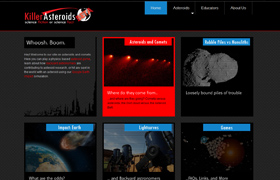
Finding NEO
The Finding NEO project produced both a website (
www.killerasteroids.org
) and a small exhibit focusing on comets, asteroids, and the role of backyard astronomers in asteroid research. Activities available on the site include a Google-Earth powered interactive that lets you explore the damage that would be caused by an asteroid landing on your own house, a risk comparison activity, and a physics-based asteroid deflection game.)
PI: James Harold; Funders: NASA, NSF; Start date: 2007

Giant Worlds: A Journey to the Outer Solar System
In the Giant Worlds traveling exhibition, visitors explore the extraordinary giant planets orbiting our Sun and learn what they tell us about the formation of solar systems, our planet, and the conditions necessary for life. The Giant Worlds exhibit includes three distinct areas: Family of the Sun, Meet the Giants, and New Frontiers. The exhibit also includes a website that features information and simulations relating to giant planets and links to NASA missions to the outer Solar System.
www.giantworlds.org.
PI: Paul Dusenbery; Funders: NSF and NASA; Start date: 2004

Great Balls of Fire: Comets, Asteroids, and Meteors
Great Balls of Fire is a museum exhibition program including two versions of the exhibit: 3,500 square feet and 1,500 square feet. The exhibits include 3 major themes: Origins of our Solar System, The Story of Asteroids and Comets, and Impacts and Risks. Both exhibits also include the interactive Asteroid Encounter where guests climb into an asteroid shaped pod and blast off into the Solar System to study comets and asteroids.
www.greatballsoffireexhibit.org
PI: Paul Dusenbery; Funders: NSF and NASA; Start date: 2009
Junior FIRST LEGO League
NCIL, FIRST Robotics, and the LEGO Foundation have have formed a partnership to establish a sustainable Junior FIRST LEGO League (Jr.FLL) program in 20 libraries nationwide. The LEGO Foundation has contributed $50K in materials. With the low costs associated with running the Jr.FLL program, libraries are an excellent avenue for reaching children (ages 6-9) in all types of communities, but especially those where resources are limited. FIRST has become a STAR_Net (provide link) partner. Phase 1 of this pilot program involves 3 local libraries (2 in Colorado and 1 in Wyoming). Phase 2 of the project will then reach an additional 17 libraries nationwide.
PI: Paul Dusenbery; Funders: Internal Funds, LEGO Foundation, FIRST; Start Date: 2014
Latino STEM Network
The Latino STEM Education Network is a group of educators who plan professional development sessions, share resources, and collaborate on the development of new projects, building on representatives from museums, media, Latino community and STEM organizations, and community/youth organizations who attended the 2009 "Expanding Informal Science for Latinos" conference.
PI: Robert Russell; Funders: private sources; Start date: 2012.
Making Space Social
This Facebook game teaches users about stellar and planetary evolution. The game features a sporadic play model, similar to the format of popular games like Farmville, Mafia, and Mousehunt. It allows players to continue to progress, even if they only spend a few minutes a day on the game. The project will examine how the informal education community can utilize these types of games to teach basic STEM concepts.
PI: James Harold; Funded by: NSF and NASA; Start Date 2010
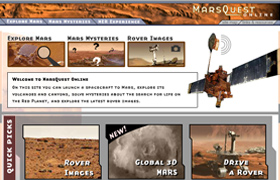
MarsQuest Online
A partnership between TERC, SSI, and NASA's Jet Propulsion Laboratory, MarsQuest Online provides website visitors with
a wide range of activities that incorporate imagery and data from spacecraft orbiting Mars and rovers on the surface (e.g. Spirit and
Opportunity). Specific activities contrast Earth and Mars, familiarize people with Martian features, probe questions related to searching for
life, and examine what it means to travel to Mars and drive a rover across the surface.
www.marsquestonline.org
PI: James Harold; Funders: NSF; Start date: 2003
MyStar
PI: James Harold; Funders: NSF, STSCI; Start date: 2009
This game is closely aligned with the national science standards, and was designed to introduce players to the basic concepts of stellar and
planetary evolution. Players can form their own star, then observe and study it as it evolves in scaled real time (a millions years per minute).
Over the course of days or weeks, players can receive email or text message prompts as their star and accompanying planetary system enter new
phases.
PI: James Harold; Funders: NSF, STSCI; Start date: 2009
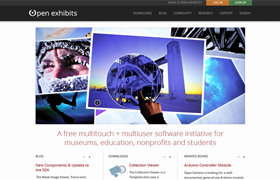
Open Exhibits
Open Exhibits is a 3-year project that will develop, test, and disseminate a free suite of original, multi-touch
enabled, open source exhibit software components. The software enables science centers and museums to do something very few of them have been
able to do in the past: assemble their own interactive computer-based exhibits and online interactive resources. Software is available at
www.OpenExhibits.org
Co-PI: Kate Haley Goldman; Funders: Ideum/NSF; Start date: 2010
School and Career Fair Visits
In conjunction with relevant projects, NCIL conducts school programs and attends career fairs to demonstrate hands-on science activities to K-12 students, and discuss the steps needed to pursue a career in the STEM disciplines. Typical demonstrations include comet making, stargazing, and kinetic astronomy. Libraries and other places of STEM learning are also welcome to request programs. If your school or career fair is interested in a presentation or booth, please contact Anne Holland (aholland@spacescience.org)
Pagina Familiar
Pagina Familiar is a full tabloid-sized newspaper page with features designed to engage Latino children and
families in science. Every two weeks, the page appears in Spanish-language newspapers across the country. It features kid-friendly bios and
interviews with scientists, hands-on activities, science cartoons featuring the characters Cientina and Mateo, and fun science stories. The page is also available to science centers, youth and community organizations, and science teachers.
PI: Robert Russell; Funders: (NSF, NIH, private funders); Start date: 2006
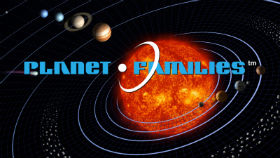
Planet Families
This simulation was originally created for the Alien Earths exhibit (www.alienearths.org). Using a real physical model, it allows visitors to build their own solar system, and then watch as
their planets and stars interact. It even includes asteroids and comets. Planet Families will be installed on a multi-user touch table at several
science centers as part of NASA's Year of the Solar System (http://solarsystem.nasa.gov/yss).
PI: Paul Dusenbery; Funders: NASA; Start date: 2010
PPI: Robert Russell; Funders: (NSF, NIH, private funders); Start date: (2009, as ConCienciaNews.com; re-launched as PulsoGlobalNews.com, 2012)
Visit Project
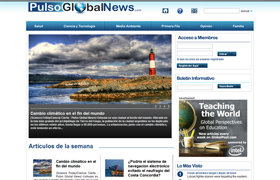
PulsoGlobalNews.com
PulsoGlobalNews.com is a weekly, Spanish-language news
services that disseminates science, health, and cultural news to Spanish-language newspapers and online news sites across the United States.
PulsoGlobalNews writes original news stories and acquires high quality news content from Maloka Science Center, Science Fridays/CienciaCierta,
and science publications throughout Latin America.
PPI: Robert Russell; Funders: (NSF, NIH, private funders); Start date: (2009, as ConCienciaNews.com; re-launched as
PulsoGlobalNews.com, 2012)
PI: Paul Dusenbery; Funders: NSF and NASA; Start date: 1999
Visit Project

Space Weather Center Website
The SWC website (www.spaceweathercenter.org) was
updated in 2008 and features educational games that are fun and easy to use by the general public or by teachers who want a fun way to
incorporate space weather and solar system science into their classroom activities. It is part of NCIL's Space Weather Outreach project. All
pages of the SWC website have been fully translated into Spanish to allow even more children and families access to education materials.
PI: Paul Dusenbery; Funders: NSF and NASA; Start date: 1999
Space Weather Outreach
The major components of the Space Weather Outreach Project are the Space Weather Center website and the Discover Space
exhibit for libraries and science centers. SWO includes the development of the Space Weather Experience for the Microsoft Surface platform. The
Surface is a multi-touch table that can recognize objects placed on it. This device will be marketed to science centers and planetariums. SWO
also includes educator workshops and a partnership with BrainPoP (www.brainpop.com).
PI: Paul Dusenbery; Funders: NSF and NASA; Start date: 1999
STAR Library Education Network
The STAR Library Education Network: a hands-on learning program for libraries and their communities, (STAR_Net for
short) is led by NCIL. STAR stands for "Science-Technology, Activities and Resources." Team members include NCIL staff, the American Library
Association (ALA), Lunar and Planetary Institute (LPI), and the National Girls Collaborative Project (NGCP). STAR_Net has developed two
comprehensive, informal education programs: Discover Earth and Discover Tech. (www.STARnetLibraries.org)
PI: Paul Dusenbery; Funders: NSF; Start date: 2010


